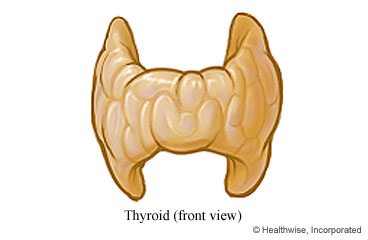Hypothyroidism: Care Instructions

Overview
You have hypothyroidism, which means that your body is not making enough thyroid hormone. This hormone helps your body use energy. If your thyroid level is low, you may feel tired, be constipated, have an increase in your blood pressure, or have dry skin or memory problems. You may also get cold easily, even when it is warm. Women with low thyroid levels may have heavy menstrual periods.
A blood test to find your thyroid-stimulating hormone (TSH) level is used to check for hypothyroidism. A high TSH level may mean that you have low thyroid. When your body is not making enough thyroid hormone, TSH levels rise in an effort to make the body produce more.
The treatment for hypothyroidism is to take thyroid hormone pills. You should start to feel better in 1 to 2 weeks. But it can take several months to see changes in the TSH level. You will need regular visits with your doctor to make sure you have the right dose of medicine.
Most people need treatment for the rest of their lives. You will need to see your doctor regularly to have blood tests and to make sure you are doing well.
Follow-up care is a key part of your treatment and safety. Be sure to make and go to all appointments, and call your doctor or nurse advice line (811 in most provinces and territories) if you are having problems. It's also a good idea to know your test results and keep a list of the medicines you take.
How can you care for yourself at home?
- Take your thyroid hormone medicine exactly as prescribed. Call your doctor or nurse advice line if you think you are having a problem with your medicine. Most people do not have side effects if they take the right amount of medicine regularly.
- Take the medicine 30 minutes before breakfast, and do not take it with calcium, vitamins, or iron.
- Do not take extra doses of your thyroid medicine. It will not help you get better any faster, and it may cause side effects.
- If you forget to take a dose, do NOT take a double dose of medicine. Take your usual dose the next day.
- Tell your doctor about all prescription, herbal, or over-the-counter products you take.
- Take care of yourself. Eat a healthy diet, get enough sleep, and get regular exercise.
When should you call for help?
Call 911 anytime you think you may need emergency care. For example, call if:
- You passed out (lost consciousness).
- You have severe trouble breathing.
- You have a very slow heartbeat (less than 60 beats a minute).
- You have a low body temperature (35°C or below).
Call your doctor or nurse advice line now or seek immediate medical care if:
- You feel tired, sluggish, or weak.
- You have trouble remembering things or concentrating.
- You do not begin to feel better 2 weeks after starting your medicine.
Watch closely for changes in your health, and be sure to contact your doctor or nurse advice line if you have any problems.
Where can you learn more?
Go to https://www.healthwise.net/patientEd
Enter N862 in the search box to learn more about "Hypothyroidism: Care Instructions".
Current as of: March 1, 2023
